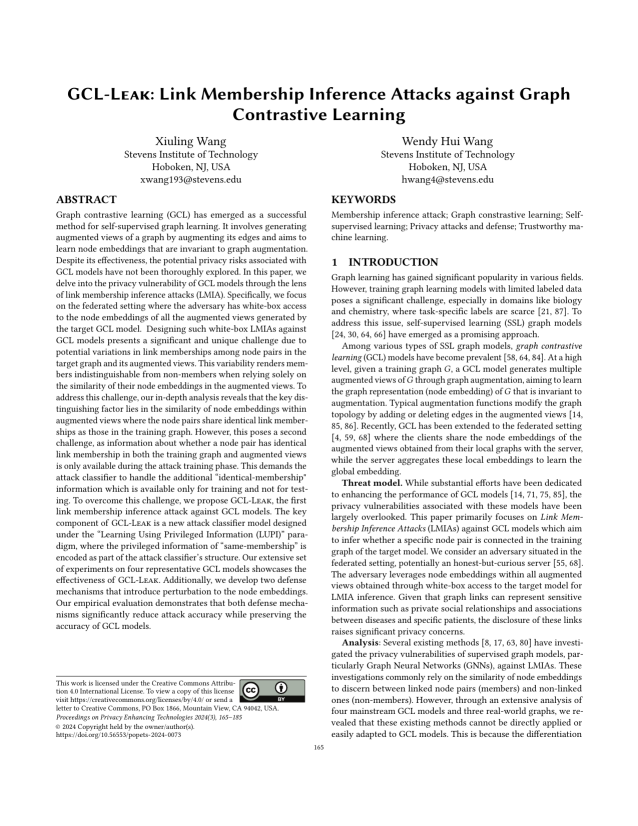GCL-Leak: Link Membership Inference Attacks against Graph Contrastive Learning
Authors: Xiuling Wang (Stevens Institute of Technology), Wendy Hui Wang (Stevens Institute of Technology)
Volume: 2024
Issue: 3
Pages: 165–185
DOI: https://doi.org/10.56553/popets-2024-0073
Abstract: Graph contrastive learning (GCL) has emerged as a successful method for self-supervised graph learning. It involves generating augmented views of a graph by augmenting its edges and aims to learn node embeddings that are invariant to graph augmentation. Despite its effectiveness, the potential privacy risks associated with GCL models have not been thoroughly explored. In this paper, we delve into the privacy vulnerability of GCL models through the lens of link membership inference attacks (LMIA). Specifically, we focus on the federated setting where the adversary has white-box access to the node embeddings of all the augmented views generated by the target GCL model. Designing such white-box LMIAs against GCL models presents a significant and unique challenge due to potential variations in link memberships among node pairs in the target graph and its augmented views. This variability renders members indistinguishable from non-members when relying solely on the similarity of their node embeddings in the augmented views. To address this challenge, our in-depth analysis reveals that the key distinguishing factor lies in the similarity of node embeddings within augmented views where the node pairs share identical link memberships as those in the training graph. However, this poses a second challenge, as information about whether a node pair has identical link membership in both the training graph and augmented views is only available during the attack training phase. This demands the attack classifier to handle the additional “identical-membership" information which is available only for training and not for testing. To overcome this challenge, we propose GCL-LEAK, the first link membership inference attack against GCL models. The key component of GCL-LEAK is a new attack classifier model designed under the “Learning Using Privileged Information (LUPI)” paradigm, where the privileged information of “same-membership” is encoded as part of the attack classifier's structure. Our extensive set of experiments on four representative GCL models showcases the effectiveness of GCL-LEAK. Additionally, we develop two defense mechanisms that introduce perturbation to the node embeddings. Our empirical evaluation demonstrates that both defense mechanisms significantly reduce attack accuracy while preserving the accuracy of GCL models.
Keywords: Membership inference attacks, Graph contrastive learning, Self-supervised learning, Privacy attacks and defense, Trustworthy machine learning
Copyright in PoPETs articles are held by their authors. This article is published under a Creative Commons Attribution 4.0 license.

